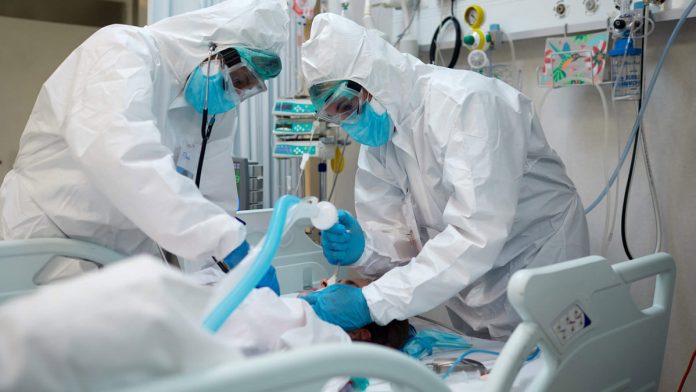ALOR SETAR – Three more Health Ministry (MOH) hospitals in Kedah are being used as COVID-19 treatment hospitals to accommodate the increase in patients at Sultanah Bahiyah Hospital (HSB), here now.
State Health and Local Government Committee chairman Datuk Dr Mohd Hayati Othman said the hospitals were Sultan Abdul Halim Hospital (HSAH) in Sungai Petani, Kuala Nerang Hospital and Kulim Hospital.
“Earlier, HSB was the only hospital for treatment of COVID-19 in the state. Based on current information received today from the Kedah State Health Department (JKN), as much as 72 per cent capacity of the COVID-19 patient ward at the hospital has been occupied, while 89 per cent of the Intensive Care Unit (ICU) ward has been filled.
“At present at (Hospital) Kulim, there is a capacity of 300 beds to accommodate patients and only 33 have been occupied, (meaning) beds are available if there are patients and at (Hospital) Kuala Nerang (there are) 72 beds with 50 more vacant, while in HSAH there are 200 beds with 63 filled,” he told reporters here, today.
Meanwhile, Mohd Hayati said so far, 110 positive COVID-19 patients in Kedah were allowed to undergo quarantine at home after receiving treatment at the hospital.
“All of them will be contacted by Kedah Health Department and the nearest District Health Office every day to ensure high rate of compliance with quarantine instructions,” he said, adding that all the patients were required to wear pink bracelets and were not allowed to leave the house.
More assessment centres
Meanwhile to the South, the Johor State Health Department is currently in the process of setting up 12 more COVID-19 Assessment Centers (CAC) to meet the needs of patients tested positive but have yet to be hospitalised.
State Environment and Health Committee chairman R.Vidyananthan said the centres were needed for patients to seek medical advice and pre-evaluation and so far there is only one CAC available in the state at Bukit Indah Health Clinic.
“Since the set up of this CAC on Jan 10 until yesterday (Jan 19), a total of 1,876 patients have been referred to the centre and of the number, only 96 patients required hospitalisation,” he said in a statement today.
He said patients need to monitor their health and should they show symptoms they must inform the hospital or the District Health Office to have their status changed.
Yesterday, Johor recorded 368 new COVID-19 cases, with the total number of cases involving Malaysians in Johor stands at 7,913 while cases involving foreigners stands at 5,794.
ASEAN CDC
The Malaysian Prime Minister’s Special Advisor on Public Health Tan Sri Dr Jemilah Mahmood in related development, said at a webinar on COVID-19 organised by the Singapore Temasek Foundation here today, that she hopes that ASEAN can have a regional Centers for Disease Control and Prevention (CDC).
“I have been mooting the idea of an ASEAN CDC. It helps us to look at low-cost solutions for the region and pulling our resources and ideas around innovation,” said Jemilah, who appeared as a panellist in the session entitled ‘International Collaboration and Partnerships’.
She said there was no reason why ASEAN could not have a regional agreement on endorsements, such as for vaccines, where approval by one of the countries could allow the others to accept and adopt it as well.
“So I think there is so much more room for improvement on the multilateral side,” she added.
As for the sustainability of the CDC, Dr Jemilah said there has to be a commitment from ASEAN member states to actually fund system establishments that will benefit the people and economies of the 10-member countries.
“We have to really invest in the region but I also feel the world has evolved and changed so fast, and destruction affects different regions, countries, and contexts in different ways. So we need to be much more diversified in finding solutions,” she said.
The session was moderated by Temasek International’s managing director (community stewardship), Shaun Seow.
Meanwhile, when asked whether countries should also share their failures in managing COVID-19, Jemilah said: “I think Sweden was very courageous to say that their approach on herd immunity was not the right one.”
“We learn best from some types of failures that we make. I would encourage that we have honest conversations as part of the learning process,” she said.
Among the other panel members at the session were A*STAR Singapore Bioinformatics Institute executive director Dr Sebastian Maurer-Stroh; Ministry of Health Singapore chief health scientist Prof Tan Chorh Chuan; and Indonesia’s Ambassador to Singapore, Suryo Pratomo.
Second highest number of daily cases
Malaysia recorded 4,008 new COVID-19 cases today, the second-highest daily figure since the pandemic hit the country, says director-general of Health Tan Sri Dr Noor Hisham Abdullah.
He said the number involved 4,003 local cases and five import cases, bringing the cumulative number of positive COVID-19 cases in Malaysia to 169,379.
“A total of 2,374 cases were reported recovered today, bringing the cumulative number of cases completely cured from COVID-19 infection to 127,662 cases or 75.4 per cent of the total number of cases,” he said in a statement today.
Selangor once again recorded the highest number of cases with 1,391, followed by Kuala Lumpur (513 cases), Johor (470 cases) and Sabah (406).
He said 11 fatalities were also reported today, involving nine citizens and two non-citizens, bringing the cumulative number of deaths in the country to 630.
The death cases involve four victims in Selangor, three each in Sabah and Johor, and one in Sarawak, all aged between 42 to 90 years with underlying medical conditions.
Meanwhile, 16 additional clusters were detected today with 11 of them involving workplaces, and the rest being community clusters, taking the total number of active clusters to 318.
The new clusters involving workplaces are the Bestari Rantau Cluster in Selangor, Jalan KKIP Selatan Cluster in Sabah, Abdul Aziz Construction Site Cluster (Selangor), Jalan Digital Construction Site Cluster (Johor, Terengganu), Tampoi Lima Cluster and Jalan Seroja Cluster in Johor.
Also detected were the Persiaran Tasek Cluster in Perak, Jalan Usaha Cluster (Melaka), Sungai Ibor Cluster (Negeri Sembilan), Sebukor Construction Site Cluster (Melaka) and Jalan Sejahtera Cluster in Kuala Lumpur.
Meanwhile, the clusters involving the community are the Batu Enam Cluster in Perak, the Bukit Gelugor Cluster in Pahang, the Jalan Niaga Cluster in Johor, the Kampung Balibata Cluster in Sabah and the Sawmill Luit Cluster in Pahang.
Dr Noor Hisham added that 246 positive cases were in the Intensive Care Unit, with 96 of them requiring respiratory assistance.













